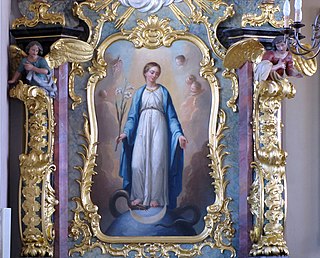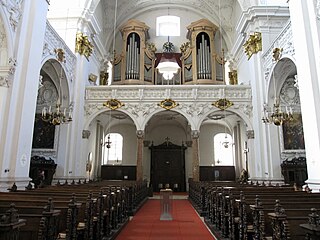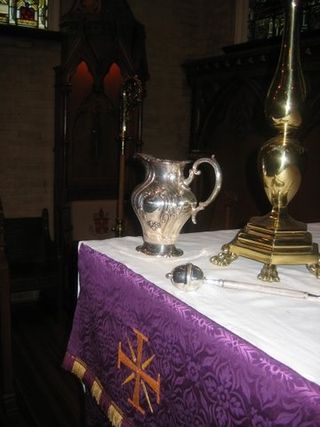
Ecce sacerdos magnus, WAB 13, is an 1885 sacred motet by the Austrian composer Anton Bruckner. It is a musical setting of the antiphon of the same title.

Virga Jesse, WAB 52, is a motet by the Austrian composer Anton Bruckner. It sets the gradual Virga Jesse floruit for unaccompanied mixed choir.

Afferentur regi, WAB 1, is a motet, which Anton Bruckner composed on 7 November 1861 on the text of the Offertorium of the Missa pro Virgine et Martyre.

Vexilla regis, WAB 51, is the final motet written by the Austrian composer Anton Bruckner.

Tota pulchra es, WAB 46, is a sacred motet by the Austrian composer Anton Bruckner.

Ave Maria, WAB 6, is a sacred motet by Anton Bruckner, a setting of the Latin prayer Ave Maria. He composed it in Linz in 1861 and scored the short work in F major for seven unaccompanied voices. The piece, sometimes named an Offertorium, was published in Vienna in 1867. Before, Bruckner composed the same prayer in 1856 for soprano, alto, a four-part mixed choir, organ and cello, WAB 5. Later, he set the text in 1882 for a solo voice (alto) and keyboard, WAB 7.

Ave Maria, WAB 5, is a setting of the Latin prayer Ave Maria by Anton Bruckner.

Os justi, WAB 30, is a sacred motet composed by Anton Bruckner in 1879. Os Justi is a Gregorian chant used as gradual of the Commune Doctorum, and as introit I and gradual II of the Commune Confessoris non Pontificis.

Pange lingua, WAB 31, is a sacred motet composed by Anton Bruckner in c. 1835. It is a setting of the first strophe of the Latin hymn Pange lingua for the celebration of Corpus Christi.

The two Asperges me, WAB 3, are sacred motets composed by Anton Bruckner. They are settings of the Latin Asperges me, the antiphon used for the celebration of Asperges.

Dir, Herr, dir will ich mich ergeben, WAB 12, is a sacred motet composed by Anton Bruckner in c. 1845.

Libera me, WAB 21, is the first of two settings of the absoute Libera me, composed by Anton Bruckner in c. 1843.

Libera me, WAB 22, is the second of two settings of the absoute Libera me, composed by Anton Bruckner in 1854.

Tantum ergo, WAB 42, is a setting of the hymn Tantum ergo composed by Anton Bruckner in 1846.

Tantum ergo, WAB 44, is the last of eight settings of the hymn Tantum ergo composed by Anton Bruckner in c. 1854.

Herz Jesu-Lied, WAB 144, is the second of two motets of Anton Bruckner's St. Florian period, which is of uncertain authorship. If Bruckner was the composer, it was composed presumably in 1845-1846.

The Two Aequali, WAB 114 & WAB 149, were composed by Anton Bruckner in 1847.

Salvum fac populum tuum, WAB 40, is a motet composed by Anton Bruckner in 1884.

Veni Creator Spiritus, WAB 50, is a motet composed by Anton Bruckner in c. 1884.

Pange lingua, WAB 33, is a sacred motet composed by Anton Bruckner in 1868. It is a setting of the Latin hymn Pange lingua for the celebration of Corpus Christi.




















